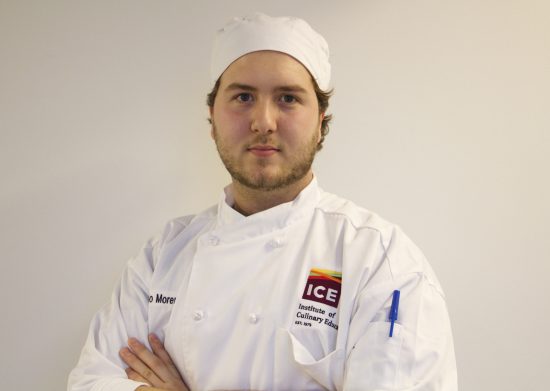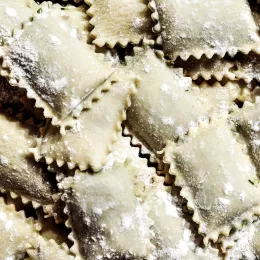Why would one of the successors to an empire of bread and pastries in Spain travel all the way to New York City to study pastry arts? That’s the question that many have posed to Pablo Moreno (Pastry Arts ’17), grandson of the founders of Mallorca Pastelería, a household name for bread and pastries in Madrid, and pastry student at ICE.
We sat down with Pablo to get the answer to this question, and to chat about topics like the most useful thing he’s learned at ICE, his advice for prospective culinary students and whether he’s a fan of New York’s holy pastry — the bagel.

When did you realize that you wanted to study pastry arts?
I always thought that I wanted to go into the family business, but more on the human resources side, like my father. After studying business, I realized that in the pastry business, you need to know more than just the business side. You have to understand the product, including how to change the product. Without that, I would never be able to get a top position in the business.
With all of the culinary schools in Spain and Europe, why did you choose to come to New York to ICE?
That’s the question that everyone is asking me. All of my family has studied in Switzerland and France. That school of cooking and pastry didn’t sound so attractive to me because it’s what I’ve seen all my life. All French schools are more or less the same.
Here, you can study French basics, but with different ideas — with the American aesthetic. I also wanted to get to know New York because of the economy. There’s so much business here. Plus, all of the trends begin in New York. When I saw the story of Dominique Ansel, for example, I was inspired to come to New York.
Speaking of New York pastries, have you tried a bagel?
Yes, I have (laughs). I'm not a fan of bagels. For me, the bad thing about bagels is that they’re so dense. I don’t know why but I have the idea that dense pastries are bad quality — because the fermentation wasn’t good.
Which pastry and baking traditions have you learned at ICE?
I’ve learned about American pastries — bagels, donuts, pretzels. I’m also learning the French school with an American taste. For example, things in the U.S. are very light-colored. When I bake something, I want it very dark.
Have you done lessons with Chef Sim Cass, the “Prince of Darkness,” yet?
I’m taking classes with him now and I really love it. For me, it’s been the best thing since I’ve been at ICE.
What is the most useful thing you’ve learned during your time at ICE?
One thing is the knowledge of American tastes. I don’t quite have it yet, but I think after my externship I’ll understand how to run a business here. In the future, if I could have one or more bakeries here in New York, I’d love that. Another thing is learning about how to make products from start to finish.
Working for my family business, I’ve seen the products developed but I’ve never seen the basics. I needed to understand the simple aspects of making bread — water, salt, flour and yeast. Afterwards I’ll be able to understand more complicated products.
I think that’s how you get to the level of someone like Sim — who touches a piece of dough and knows how it was made.
My uncle is exactly the same. My uncle is the judge for the competition of the best croissants in Spain. He can look at a table of croissants and see which is the best. I need to get to that level.
What has been your favorite lesson so far?
I don’t like sugar at all, but I love the lessons about sugar — understanding how to cook sugar and the different colors and temperatures. The lessons made me understand something that I would never understand otherwise because I don’t like sweets. But my favorite classes have been the ones with Sim, especially when we made Italian breads. I also enjoyed the trip to Dominique Ansel.
If you could travel anywhere in the world to sample pastries, where would you go and why?
Two countries. First, I’d go to France. I’ve been in France but without the knowledge of how to appreciate the pastries. I really prefer Italian baking though — the olive oil culture is the best flavor in the world. I love how they make breads like ciabatta and focaccia. They’re hollow inside but have a strong flavor. I wouldn’t go to the typical places like Rome or Florence. I would go to Sicily and see how they make bread there. One pastry I love is panettone.
What advice would you give someone considering going to culinary school?
Some people look for the fanciest school and, to me, that approach is wrong. People want to make the best-plated dessert and I think you’re not going to learn that in school. The things you should learn in school are the basic skills — knife skills, fermentation, sugar cooking — basic things that you will build on when you get a job.
The good thing about ICE is that they start with the basics. You need to learn the fundamentals because afterwards that’s what defines you from your colleagues who haven’t gone to culinary school. They may be much faster than you, but they don’t have the knowledge of why something should be made a certain way. You can be in control of changing a recipe, while the other person only knows how to make it.
Ready to launch your career in pastry arts? Click here for more information on ICE’s career programs.




